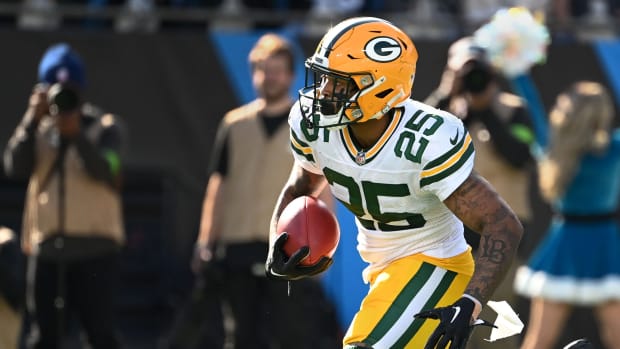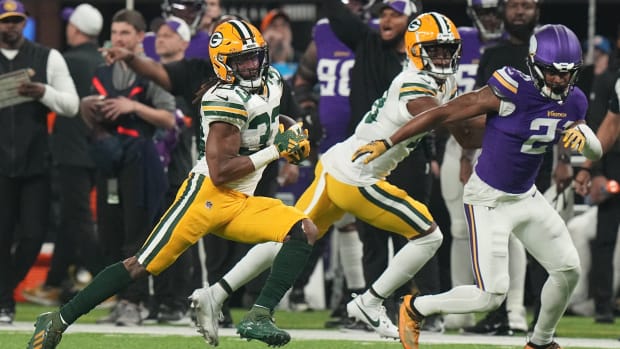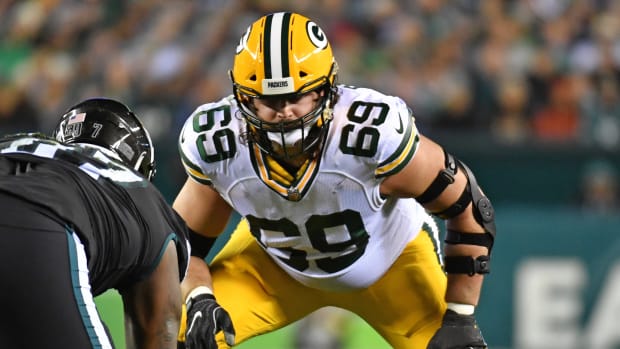Who Has Edge When No. 1 Offense Faces No. 1 Defense in Playoffs?
GREEN BAY, Wis. – What happens when an irresistible force meets an immovable object?
There are many names for that paradox, including the irresistible force paradox. It’s also called Saturday’s NFC divisional playoff game between the Green Bay Packers and Los Angeles Rams.
The Green Bay Packers are No. 1 in the NFL in scoring. They scored the 20th-most points in NFL history, tied the record with a dozen 30-point games and became the only team to ever score 200 points in a single quarter (the second quarter). The unit is driven by presumptive MVP quarterback Aaron Rodgers and record-setting receiver Davante Adams.
The Los Angeles Rams are No. 1 in the NFL in scoring defense, total defense and passing defense. They’ve allowed 20 points or less in nine of their 17 games. The unit is driven by potential Defensive Player of the Year Aaron Donald and All-Pro cornerback Jalen Ramsey.
Dating to 1990, this will be the eighth playoff matchup featuring the top-ranked scoring offense and the top-ranked scoring defense. The team with the top defense won four of those seven games – hardly an overwhelming advantage one way or the other.
The games:
2020 NFC Divisional: Green Bay (31.8) vs. Los Angeles Rams (18.5).
2016 Super Bowl: Atlanta (33.8) vs. New England (15.6). Result: New England 34, Atlanta 28 (OT).
2015 NFC Divisional: Carolina (31.3) vs. Seattle (17.3). Result: Carolina 31, Seattle 24.
2014 NFC Championship: Green Bay (30.4) at Seattle (15.9). Result: Seattle 28, Green Bay 22.
2013 Super Bowl: Denver (37.9) vs. Seattle (14.4). Result: Seattle 43, Denver 8.
1997 AFC Divisional: Denver (29.5) at Kansas City (14.5). Result: Denver 14, Kansas City 10.
1993 NFC Divisional: San Francisco (29.6) vs. New York Giants (12.8). Result: San Francisco 44, New York 3.
1990 Super Bowl: Buffalo (26.8) vs. New York Giants (13.2). Result: New York 20, Buffalo 19.
“Defense wins championships,” or so the saying goes, but the No. 1 vs. No. 1 history suggests there’s no strong correlation.
“I think it’s about who plays the best in that three-and-a-half-hour window,” Rams coach Sean McVay said on Tuesday. “It’s going to be a five-star matchup between a great defense and a great offense. I would say I’ll take the defense, because that’s the team that I’m on and I feel very confident in the way that they’ve carried us in a lot of games this year. They were obviously a huge part of how we got it done the other day. I think this is the greatest challenge that we’ve had yet as a defense and I’m looking forward to it.”
Of course, Green Bay’s offense vs. Los Angeles’ defense isn’t the only matchup. The Rams’ offense has to battle the Packers’ defense, and there will be special-teams snaps, as well.
Here’s another way to look at the games, with their scoring rankings on offense and defense.
2020 NFC Divisional: Green Bay (No. 1 points scored, No. 13 points allowed) vs. Los Angeles Rams (No. 22 points scored, No. 1 points allowed.) Advantage: Green Bay.
2016 Super Bowl: Atlanta (No. 1 points scored, No. 27 points allowed) vs. New England (No. 3 points scored, No. 1 points allowed). Advantage: New England. Winner: New England.
2015 NFC Divisional: Carolina (No. 1 points scored, No. 6 points allowed) vs. Seattle (No. 4 points scored, No. 1 points allowed). Advantage: Seattle. Winner: Carolina.
2014 NFC Championship: Green Bay (No. 1 points scored, No. 13 points allowed) at Seattle (No. 10 points scored, No. 1 points allowed). Advantage: Seattle. Winner: Seattle.
2013 Super Bowl: Denver (No. 1 points scored, No. 22 points allowed) vs. Seattle (No. 8 points scored, No. 1 points allowed). Advantage: Seattle. Winner: Seattle.
1997 AFC Divisional: Denver (No. 1 points scored, No. 5 points allowed) at Kansas City (No. 5 points scored, No. 1 points allowed). Advantage: None. Winner: Denver.
1993 NFC Divisional: San Francisco (No. 1 points scored, No. 17 points allowed) vs. New York Giants (No. 19 points scored, No. 1 points allowed). Advantage: San Francisco. Winner: San Francisco.
1990 Super Bowl: Buffalo (No. 1 points scored, No. 6 points allowed) vs. New York Giants (No. 15 points scored, No. 1 points allowed). Advantage: Buffalo. Winner: New York.
From that perspective, the more well-rounded team tends to win with a 4-2 record. That bodes well for the Packers, who surged to No. 13 in points allowed after a strong finish to the season. Los Angeles finished 22nd in scoring. It tallied just 27 points in its final two regular-season games. In a 30-20 wild-card victory at Seattle last week, the Rams went just 3-of-15 on third down but bolstered their scoring total with a defensive touchdown and a special-teams takeaway that set up another score.
Finally, perhaps this is noteworthy: Of the three prior divisional-round matchups, two of the top-scoring teams had first-round byes. Those teams, Carolina and San Francisco, had big offensive performances, with the Panthers matching their season-long output and the 49ers eclipsing their season average by more than two touchdowns.
“When you get into the situation there’s eight teams left, every team is good,” Rodgers said. “And I’d say all of them have really good defenses, too. There’s no cakewalks. There’s no easy games. It comes down to execution and the little things that we talk about all the time. We always talk about starting fast. We’ve done a good job at that, scoring on the first possession of many games this season, which would definitely help us on Saturday. But we know it’s going to be a game that goes the distance.”




